Dissociation and Sleep Problems: Natural Sleep Support Supplements
Introduction
Dissociation and sleep disturbances often go hand in hand. When your body won’t rest and your mind won’t quiet down, it’s not simply insomnia — it’s your nervous system struggling to feel safe enough to relax. People who experience trauma, chronic stress, or emotional overload often describe nights spent half-awake, trapped between fatigue and hyper-alertness. The mind floats, detached from the body, and real rest never arrives.
This article explores why dissociation disrupts sleep and how natural supplements — from magnesium and glycine to L-theanine, melatonin, and adaptogens — can help restore balance. We’ll also look at how calming breathwork, nutrition, and nervous-system support can enhance those effects, helping you rebuild the connection between rest and safety. 🌿
Looking for supplements for This? Click here.
The Link Between Dissociation and Sleep 🧠

Dissociation is the brain’s built-in escape hatch. When life feels overwhelming and the body perceives danger, the nervous system switches from engagement to protection. The stress response floods the body with cortisol and adrenaline — hormones meant to help you survive — and when that response stays active too long, the body begins to shut parts of itself down to conserve energy.
At night, this imbalance makes it almost impossible to rest. The HPA axis (hypothalamic-pituitary-adrenal axis), which regulates stress and circadian rhythm, becomes dysregulated. Cortisol — which should fall in the evening — remains high, keeping the brain on alert. The result is a strange mix of exhaustion and hypervigilance: your body begs for sleep, but your brain won’t let go.
For people prone to dissociation, this cycle can be even more intense. Because dissociation relies on a “freeze” state — a parasympathetic shutdown following extreme arousal — the body alternates between overdrive and collapse. You may stay numb all day, then find yourself wide awake at night, your system caught between anxiety and emptiness.
Healing this pattern means calming the nervous system so that the body once again recognizes nighttime as a signal of safety, not threat.
Why Trauma and Dissociation Disrupt Sleep
When trauma rewires the brain, it changes how we experience rest. The amygdala, the brain’s alarm center, stays hyperactive even when there’s no danger. The prefrontal cortex, which regulates rational thought, becomes underactive. The hippocampus, which manages memory and time, loses volume and sensitivity.
These structural changes keep the brain scanning for danger, even during deep sleep cycles. People with chronic dissociation or PTSD often experience:
Difficulty falling or staying asleep
Vivid nightmares or blank dream states
Emotional numbness during the day and overarousal at night
Morning fatigue despite long hours in bed
What’s happening is that the body no longer recognizes rest as safe. Even when you lie down, the stress system remains partially active, preventing full descent into REM sleep — the stage essential for emotional regulation and memory consolidation.
The good news? Nutrients and herbal compounds can re-educate the nervous system by lowering cortisol, restoring neurotransmitter balance, and promoting deeper, more restorative sleep.
The Role of Neurochemistry in Dissociative Insomnia 🌌
To sleep well, the brain must shift from excitatory to inhibitory activity. During the day, neurotransmitters like glutamate and norepinephrine keep you alert. At night, chemicals like GABA, serotonin, and melatonin take over, slowing neural firing and inducing relaxation.
In dissociation, this switch gets stuck. Chronic stress depletes serotonin and dopamine, reducing melatonin synthesis. Meanwhile, cortisol and adrenaline stay elevated, keeping the body in mild fight-or-flight even at bedtime.
Restoring this rhythm naturally requires supporting the neurotransmitters that create calm — especially GABA and serotonin. This is where certain natural supplements shine.
Magnesium: The Mineral of Calm 🌿
Magnesium is one of the most important minerals for sleep and nervous system health. It regulates over 300 biochemical reactions, including those that control muscle tension, heart rhythm, and brain signaling.
When magnesium levels drop — often due to stress, caffeine, or poor diet — neurons become overexcited. You feel restless, anxious, or physically tense, all of which block sleep. Magnesium also influences the GABA receptor, helping calm neural activity.
For dissociative insomnia, magnesium can be grounding. It relaxes the body without sedation and gently reduces cortisol. Some forms are especially effective for sleep:
Magnesium glycinate soothes the nervous system and muscles, supporting relaxation.
Magnesium threonate crosses the blood-brain barrier, enhancing cognitive calm and memory integration.
Epsom salt baths (magnesium sulfate) deliver magnesium through the skin while providing the soothing ritual of warm immersion — perfect for reconnecting with body sensations.
Many people with dissociation describe magnesium as the first supplement that helps them “feel back in their body” — calm, heavy, safe.
Glycine: Deepening Rest and Temperature Regulation 🌙
Glycine is a simple amino acid that acts as a neurotransmitter. It cools the body’s core temperature and promotes the drop needed to fall asleep easily. It also supports serotonin synthesis, indirectly improving melatonin production.
For people with dissociation, glycine offers gentle grounding. By lowering body temperature and slowing the heart rate, it signals to the nervous system: You can let go now.
Research shows that taking 3 grams of glycine before bed shortens time to sleep onset and improves sleep quality without grogginess the next morning. It’s especially effective when stress has kept cortisol high or when your body feels “wired but tired.”
Looking for supplements for This? Click here.
L-Theanine: The Calm-Alert State 🍵
L-Theanine, found in green tea, is a natural compound that increases alpha brain waves — the same waves seen during meditation and relaxed awareness. It enhances GABA, serotonin, and dopamine while reducing excitatory glutamate activity.
Unlike sedatives, it doesn’t knock you out; it balances. For those with dissociation, it helps bridge the gap between being “checked out” and being overly alert.
A dose of 200–400 mg of L-theanine an hour before bed can ease mental chatter and quiet intrusive thoughts, setting the stage for peaceful rest. When combined with magnesium or glycine, it supports both cognitive calm and physical relaxation.
Melatonin: The Body’s Timekeeper 🕰️
Melatonin is the hormone that tells your body when to sleep. Produced from serotonin in the pineal gland, it rises at night when light levels drop and falls in the morning with sunlight.
Chronic stress, late-night screen exposure, and disrupted circadian rhythms all suppress melatonin. People with dissociation may also have irregular melatonin release due to HPA axis dysregulation.
Short-term melatonin supplementation (0.5–3 mg about 30–60 minutes before bed) can help reset your sleep-wake cycle. For sensitive individuals, smaller doses often work better than large ones.
However, melatonin isn’t just for sleep — it’s also a neuroprotectant. It reduces oxidative stress and inflammation, supports mitochondrial health, and balances immune function — all essential for recovering from the wear of chronic stress and trauma.
Herbal Sleep Allies: Nature’s Soothing Touch 🌸
Several herbs have been used for centuries to promote relaxation and better sleep. They don’t just induce drowsiness; they modulate neurotransmitters, reduce anxiety, and recondition the body toward rest.
Valerian Root 🌿
Valerian enhances GABA activity and shortens the time it takes to fall asleep. It also reduces nighttime awakenings. For trauma-related insomnia, valerian’s mild sedative effects can be comforting without suppressing REM cycles.
Passionflower 💜
Passionflower calms an overactive mind by increasing GABA and lowering glutamate. It’s especially helpful for those who can’t stop mental looping before bed — a common issue for people whose nervous systems have learned to scan for danger.
Chamomile 🌼
Chamomile contains apigenin, a flavonoid that binds to benzodiazepine receptors, inducing relaxation without addiction. Beyond sleep, its gentle scent and ritualistic tea form help reconnect the senses — a key part of healing dissociation.
Adaptogens for Nighttime Calm 🌾
While adaptogens like Ashwagandha and Rhodiola are often discussed for daytime stress, they also play a nighttime role. By balancing cortisol, they help synchronize your circadian rhythm.
Ashwagandha, in particular, supports GABA receptors and reduces nighttime cortisol spikes that cause 3 a.m. awakenings. Studies show it improves both sleep quality and next-day alertness.
A bedtime dose of 300–600 mg of standardized root extract can promote restorative sleep, especially when chronic stress has disrupted hormonal balance.
The Role of Serotonin and Gut Health 🦠
About 90% of serotonin — the precursor to melatonin — is produced in the gut. That means digestive inflammation or dysbiosis (imbalance in gut bacteria) can directly impact sleep and dissociative symptoms.
Probiotics and prebiotics that support strains like Lactobacillus and Bifidobacterium may improve serotonin availability and help restore regular sleep cycles. Pairing gut support with supplements that enhance serotonin (like magnesium, tryptophan, or vitamin B6) creates a foundation for stable circadian rhythms.
Sleep and the Vagus Nerve 🌬️

The vagus nerve connects the brain and body, coordinating heart rate, digestion, and relaxation. When the vagus nerve has poor “tone” — often seen in trauma survivors — it’s harder for the body to downshift into sleep.
Natural supplements that support vagal tone include magnesium, omega-3 fatty acids, and adaptogens. Breathwork also stimulates the vagus nerve; slow exhales before bed enhance parasympathetic activation. When combined with calming supplements, the body learns again how to transition naturally into rest.
Building a Nighttime Routine That Reinforces Safety 🌌
Supplements work best when paired with rituals that tell your body: It’s safe to rest. For those healing from dissociation, nighttime can feel threatening — silence or darkness may trigger memories of danger or loss of control. A structured, sensory-soothing routine helps rewrite those associations.
Warm magnesium baths, soft lighting, gentle stretching, or writing before bed signal to the body that you’re in control and that sleep is not a threat but a gift. These rituals strengthen the feedback loop between biochemistry and behavior, helping supplements take deeper root.
Nutrients That Enhance Supplement Effects 🍎
Certain vitamins and minerals amplify sleep support naturally.
Vitamin B6 is necessary for converting tryptophan to serotonin, and later serotonin to melatonin. Deficiency can cause both insomnia and vivid, stressful dreams.
Zinc stabilizes GABA and glutamate signaling, reducing excitatory stress chemistry.
Omega-3 fatty acids lower inflammation and improve communication between brain cells, promoting calm and stable sleep cycles.
Together with magnesium and adaptogens, these nutrients rebuild the neurochemical foundation of safe rest.
From Numbness to Surrender: Emotional Aspects of Sleep 💤
For people with dissociation, the act of falling asleep itself can feel unsafe. Letting go means surrendering control — the very thing the body learned to fear. This subconscious tension keeps you half-awake, ready to flee.
Natural sleep supplements don’t just change chemistry; they help re-train the nervous system to associate stillness with safety. The goal isn’t sedation — it’s trust. When your body learns that rest doesn’t equal vulnerability, you can drift into genuine, healing sleep.
Sometimes, this process brings up emotion. Dreams may become more vivid as the mind integrates stored experiences. That’s a sign of reconnection — your body and mind communicating again after years of silence.
Scientific Research and Clinical Insights 📚
Modern studies support the role of these nutrients and herbs in restoring both sleep and emotional regulation:
A 2017 Nutrients review found that magnesium supplementation improved insomnia, especially in those with anxiety or stress disorders.
A 2019 Nutrients trial on ashwagandha showed significant improvements in sleep onset, quality, and total duration in adults with insomnia.
L-theanine has been repeatedly shown to increase alpha-wave activity and reduce stress-related cortisol, creating a calm readiness for sleep.
Melatonin supplementation, in low doses, was found in Sleep Medicine Reviews (2020) to help re-establish circadian rhythm in PTSD and shift-work populations.
Glycine supplementation (3 g) improved subjective sleep quality and reduced fatigue in studies published in Sleep and Biological Rhythms.
Together, these findings confirm what many trauma-informed clinicians observe: sleep problems linked to dissociation are not psychological alone — they are biological symptoms of a nervous system stuck in survival mode, and they can be helped through natural biochemical support.
Integrating Supplements with Therapy and Breathwork 🌬️🧘
Supplements are most effective when combined with mind-body integration practices. Somatic therapies like EMDR, body-based mindfulness, and trauma-sensitive yoga can help the nervous system release stored energy.
Breathwork is especially powerful before bed. Slow, rhythmic breathing (such as inhaling for 4 seconds, exhaling for 6–8 seconds) lowers heart rate and cortisol while enhancing GABA activity. Combined with magnesium or L-theanine, it helps create a physiological bridge from alertness to rest.
Want to try Breathwork? Click Here.
Therapy adds another layer. As sleep improves, your capacity to process emotion and memory expands. Each restful night becomes a quiet rehearsal for presence — proof that the body can rest and the mind can stay connected.
Looking for online therapy ? Click Here.
Reclaiming Rest as Safety 🌙
Healing dissociative insomnia is not about forcing sleep — it’s about rebuilding safety. Supplements simply provide the raw materials for that transformation: the minerals that calm nerves, the amino acids that rebuild neurotransmitters, the herbs that teach the body equilibrium.
Sleep becomes not just recovery, but reconnection — a nightly return to the self. When you wake feeling grounded and whole, you know your nervous system is remembering what peace feels like.
Every moment of rest tells your body: You’re safe to exist here. You can rest, you can feel, you can be. 🌿💫
Looking for online therapy ? Click Here.
References
Boyle, N. B., et al. (2017). “The effects of magnesium supplementation on subjective anxiety and stress.” Nutrients, 9(5): 429.
Takahashi, M., et al. (2015). “Glycine ingestion improves subjective sleep quality.” Sleep and Biological Rhythms, 13(1): 1–8.
Hidese, S., et al. (2019). “Effects of chronic L-theanine administration on stress and cognitive function.” Nutrients, 11(10): 2362.
Chandrasekhar, K., et al. (2012). “A prospective, randomized study on ashwagandha root extract and stress.” Indian Journal of Psychological Medicine, 34(3): 255–262.
Brzezinski, A., et al. (2020). “Melatonin and sleep regulation.” Sleep Medicine Reviews, 50: 101296.
Panossian, A., & Wikman, G. (2010). “Effects of adaptogens on the central nervous system.” Pharmaceuticals, 3(1): 188–224.
Gerbarg, P. L., & Brown, R. P. (2016). “Breathing practices for stress and trauma recovery.” Annals of the New York Academy of Sciences, 1373(1): 66–77.
van der Kolk, B. A. (2014). The Body Keeps the Score. Viking.
Lanius, R. A., et al. (2018). The Neurobiology and Treatment of Trauma-Related Dissociation. Routledge.
Lopresti, A. L., et al. (2019). “Natural compounds for stress-related sleep disorders.” Phytotherapy Research, 33(12): 3151–3171.
Related Posts
-

Why Co-Dependency Feels Draining: Adrenal Fatigue and Supplements That Help
The adrenal glands are small but powerful organs that sit above your kidneys, acting as your body’s built-in stress managers. They produce hormones like cortisol and adrenaline that help regulate energy, mood, and resilience. When they’re overworked from chronic stress or emotional exhaustion, fatigue and imbalance follow. Supporting adrenal health naturally can help restore calm, energy, and hormonal balance. 🌿⚡
-

The Link Between Anxiety, Co-Dependency, and Natural Support
Anxiety feels like living in constant alert mode—your heart races, your thoughts loop, and your body can’t find peace. It’s the nervous system’s way of preparing for danger, even when none exists. Understanding what’s happening in your mind and body is the first step toward calming the storm and restoring balance. 🌿💫
-

Supplements That Support Dopamine and Serotonin in Co-Dependent Patterns
Serotonin is the neurotransmitter of calm, confidence, and contentment. When it’s balanced, you feel peaceful and emotionally grounded. When it’s low, anxiety, mood swings, and emotional dependence take over. By understanding serotonin’s role in emotional health—and how to support it naturally—you can rebuild inner stability, improve relationships, and cultivate lasting happiness from within. 🌞💫
-

How Emotional Exhaustion in Codependency Impacts the Nervous System
The nervous system is the body’s communication network, connecting the brain to every organ and muscle. It regulates stress, mood, and emotion through a delicate balance of electrical and chemical signals. When overwhelmed, it can become dysregulated—leading to fatigue, anxiety, and emotional imbalance. Understanding how to calm and strengthen the nervous system is key to healing from chronic stress and emotional burnout. ⚡🌿
-

What Is Co-Dependency? The Role of Brain Chemistry and Stress
Stress is more than a feeling—it’s a full-body experience that begins in the brain and ripples through every cell. When cortisol surges and the nervous system stays on alert, your body can’t rest or recover. Over time, this constant tension affects energy, focus, mood, and even immune health. Understanding stress chemistry is the first step toward breaking free from burnout and finding calm again. 🌿
-

Creating a Supplement Stack for Motivation, Energy, and Anti-Procrastination
Motivation is the fuel behind every meaningful achievement—but it’s not just about willpower. It’s a mix of mindset, brain chemistry, and momentum. When energy, focus, and purpose align, action feels natural instead of forced. Learn how to harness motivation as a daily state, not a fleeting feeling.
-

Supplements for Building Consistency and Reducing Chronic Procrastination
Biochemistry is the bridge between biology and chemistry—the science of life at the molecular level. It explains how nutrients, hormones, and neurotransmitters interact to create energy, thought, and emotion. From brain function to muscle movement, biochemistry reveals the invisible processes that sustain health, balance, and vitality.
-

GABA and Procrastination: Supporting Calm Focus for Productivity
GABA is the brain’s natural calming messenger—a neurotransmitter that helps slow mental overactivity and ease stress. When GABA levels drop, focus fades, anxiety rises, and procrastination becomes more likely. By supporting GABA through nutrition, lifestyle, and supplements, you can restore calm clarity, improve focus, and take action with steady, balanced energy.
-

Ashwagandha and Procrastination: Lowering Stress to Improve Action
Science is the language of curiosity and discovery. It helps us understand the hidden patterns behind life, energy, and the universe. Through experimentation and critical thinking, science connects imagination to evidence—turning questions into knowledge. Whether through microscopes, molecules, or minds at work, science represents our endless pursuit of truth and innovation.
-

Neurotransmitters and Motivation: Supplements That Support Drive and Focus
Supplements can do more than boost physical health—they can also enhance mental clarity, focus, and motivation. Nutrients like omega-3s, magnesium, B vitamins, and adaptogens help balance neurotransmitters, stabilize mood, and support brain energy. When combined with good sleep, nutrition, and mindful habits, they can transform how your brain performs under stress.
-

How Stress Hormones Like Cortisol Fuel Procrastination (and What Helps)
Blood sugar isn’t just about physical health—it directly impacts focus, mood, and motivation. When glucose levels spike and crash, energy and attention do the same, fueling procrastination and brain fog. Learning how to stabilize blood sugar through balanced meals, mindful habits, and key nutrients helps keep your mind steady, focused, and ready to act.
-

Brain Fog and Procrastination: Supplements for Mental Clarity
Brain fog can turn even simple tasks into mental hurdles. When your thoughts feel slow and unclear, procrastination often follows—making focus and productivity seem impossible. This article explores the biochemical and lifestyle causes of brain fog and reveals the most effective supplements for restoring mental clarity, focus, and sustained energy.
-

The Link Between Low Energy and Procrastination: Can Supplements Help?
Neurochemistry shapes how we think, feel, and act. When neurotransmitters like dopamine, serotonin, and GABA fall out of balance, it can lead to fatigue, anxiety, or lack of motivation—fueling procrastination and low mood. Understanding the brain’s chemical communication system helps us find ways to restore focus, calm, and emotional stability through nutrition, mindfulness, and targeted supplements.
-

Why Do We Procrastinate? The Role of Dopamine and Supplements That Support It
Dopamine is the brain’s motivation messenger—the chemical that fuels focus, reward, and drive. When dopamine levels drop, even simple tasks can feel impossible to start. This article explores how dopamine shapes procrastination, motivation, and mental energy, along with natural supplements and daily habits that help restore balance and get things done.
-

Phosphatidylserine and Stress Reduction for People with BDD
Stress is more than a mental state—it’s a full-body experience that affects hormones, brain chemistry, and emotional balance. For people with Body Dysmorphic Disorder (BDD), constant tension and worry about appearance can overload the nervous system. Learning how stress works and finding ways to calm it is key to breaking the cycle of anxiety and self-criticism.
-

How Antioxidants Like Vitamin C & E Support Mental Health in BDD
Antioxidants are the body’s natural defense against stress and inflammation. For people with Body Dysmorphic Disorder (BDD), oxidative stress can worsen fatigue, anxiety, and emotional imbalance. Nutrients like Vitamin C and E help protect brain cells, boost neurotransmitter function, and support a calmer, clearer mindset—building a stronger foundation for recovery.
-

Ginkgo Biloba and Memory Support for BDD Recovery
Emotional regulation is the foundation of healing from Body Dysmorphic Disorder (BDD). When the nervous system stays in constant overdrive, even small stressors can trigger self-critical spirals. Learning to calm emotional reactivity helps restore clarity, confidence, and a sense of inner balance. By blending mindfulness, nervous system support, and self-compassion, you can retrain your brain to respond—not react—to emotion.
-

Alpha GPC and Cognitive Function in Body Dysmorphic Disorder
Mental fatigue can feel like your brain has hit a wall—thoughts slow down, focus fades, and motivation disappears. For people with Body Dysmorphic Disorder (BDD), chronic overthinking, emotional stress, and constant self-evaluation can deplete mental energy even further. Understanding what causes this cognitive exhaustion is the first step toward recovery—through rest, balanced nutrition, and targeted brain-supporting supplements.
-

N-Acetyl L-Tyrosine and BDD: Supporting Mental Clarity
Chronic stress doesn’t just affect your mood—it reshapes your brain chemistry, weakens focus, and fuels the obsessive thought loops common in Body Dysmorphic Disorder (BDD). Over time, constant cortisol elevation drains mental energy and emotional balance. Learning to recognize and manage chronic stress is essential to restoring mental clarity, self-compassion, and resilience.
-

Chamomile and Lavender for Calming Obsessive Body Image Thoughts
The nervous system is the command center of our emotional and physical world—and in Body Dysmorphic Disorder (BDD), it often operates in overdrive. Understanding how the brain and body communicate under stress reveals why intrusive thoughts feel uncontrollable. Learning to regulate the nervous system through calm practices, nutrition, and supplements helps restore inner balance and emotional safety.
-

Adaptogens for Body Dysmorphic Disorder: Rhodiola, Ginseng, and More
Rhodiola rosea, often called the “golden root,” is an adaptogenic herb renowned for boosting stress resilience and mental endurance. For individuals with Body Dysmorphic Disorder (BDD), Rhodiola may help reduce fatigue, regulate cortisol, and enhance emotional balance. By supporting both mind and body, this powerful plant promotes calm focus, improved mood, and renewed energy to face daily challenges.
-

B Vitamins for Stress Resilience in BDD: Rebuilding Calm from Within
Biochemistry is at the heart of every thought, emotion, and reaction we experience. In Body Dysmorphic Disorder (BDD), chemical imbalances in neurotransmitters like serotonin, dopamine, and GABA can amplify stress and distort self-perception. Understanding the biochemistry behind mood and stress regulation offers a path toward healing—bridging the gap between emotional experience and the body’s molecular balance.
-

Melatonin and Body Dysmorphic Disorder: Restoring Healthy Sleep Patterns
Melatonin, the body’s natural sleep hormone, plays a vital role in helping people with Body Dysmorphic Disorder (BDD) restore healthy sleep cycles. When anxiety and obsessive thinking interfere with rest, melatonin levels often drop, leading to more emotional reactivity and distorted self-perception. This article explores how melatonin works, why BDD disrupts it, and how natural supplementation—combined with mindful routines—can help the brain and body finally find calm at night.
-

Sleep Struggles with BDD: Supplements for Rest and Recovery
When you’re living with Body Dysmorphic Disorder (BDD), restful sleep can feel impossible—but the right supplements can help reset your body’s natural rhythm. From magnesium and L-theanine to 5-HTP and ashwagandha, these nutrients support relaxation, lower cortisol, and enhance melatonin production. This article explores how supplements can calm the mind, ease nighttime anxiety, and promote true restorative sleep for emotional and physical recovery.
-

5-HTP and Serotonin Balance: Could It Help with Body Dysmorphic Disorder?
Anxiety can feel like a storm inside the mind—restless, overwhelming, and hard to control. In people with Body Dysmorphic Disorder (BDD), anxiety often fuels obsessive thoughts and self-criticism, creating a painful cycle of worry and self-doubt. This article explores the biological roots of anxiety, the role of neurotransmitters like serotonin and GABA, and how natural strategies such as mindfulness, supplements, and nervous system regulation can restore calm and mental clarity.
-

Can Ashwagandha Help Ease Stress and Anxiety in Body Dysmorphic Disorder?
Neurotransmitters like serotonin, dopamine, GABA, and acetylcholine are the chemical messengers that shape how we think, feel, and react to stress. In Body Dysmorphic Disorder (BDD), imbalances in these neurotransmitters can amplify anxiety, obsessive thinking, and emotional distress. This article explores how restoring healthy brain chemistry through nutrition, supplements, and mindfulness can help bring clarity, calm, and emotional stability.
-

L-Theanine for BDD: Finding Calm in the Mind
Neurochemistry plays a central role in how we think, feel, and see ourselves. For those living with Body Dysmorphic Disorder (BDD), imbalances in neurotransmitters like serotonin, dopamine, and GABA can intensify anxiety, obsessive thoughts, and emotional distress. This article explores how regulating brain chemistry through supplements, mindfulness, and lifestyle changes can bring the nervous system back into harmony and restore inner calm.
-

Omega-3 Fatty Acids and Body Image Disorders: Supporting Emotional Health
Omega-3 fatty acids do far more than support heart health—they nourish the brain, stabilize mood, and may ease the emotional turbulence tied to body image disorders like BDD. This in-depth article explores how omega-3s regulate serotonin, dopamine, and inflammation, helping individuals reduce obsessive thoughts and rebuild self-acceptance. It also connects nutrition to therapy, mindfulness, and nervous system balance for holistic emotional healing.
-

Magnesium and BDD: Calming an Overactive Nervous System
Magnesium plays a crucial role in calming an overactive nervous system—something people with Body Dysmorphic Disorder (BDD) struggle with daily. This article explores how magnesium supports relaxation, emotional regulation, and stress reduction while diving into the science behind its connection to brain chemistry. It also examines how combining magnesium supplementation with therapy and breathwork can help rebalance the body’s stress response, reduce obsessive thought patterns, and promote lasting nervous system calm.
-

The Gut-Brain Axis and BDD: Why Probiotics Might Matter
The gut and brain are constantly in conversation — and that dialogue may shape how you experience Body Dysmorphic Disorder. By nurturing your microbiome with probiotics, prebiotics, and gut-healing nutrients, you can help rebalance serotonin, calm anxiety, and restore emotional stability from within 🧠🦠.
-
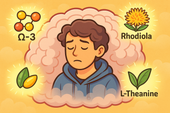
Brain Fog and Body Dysmorphic Disorder: Can Nootropic Supplements Help?
Brain fog often accompanies Body Dysmorphic Disorder, clouding focus and deepening emotional fatigue. Nootropic supplements like L-theanine, Rhodiola, and CoQ10 can help restore mental clarity, balance neurotransmitters, and bring calm energy back to the mind 🌿🧠.
-

How Stress Hormones Like Cortisol May Worsen Body Dysmorphic Disorder
Chronic stress floods the brain with cortisol — the hormone that keeps you on high alert. In Body Dysmorphic Disorder, this chemical overdrive fuels anxiety, distorts self-image, and traps the body in survival mode. Calming cortisol helps restore both peace and perspective 🌿🧠.
-

The Role of Neurotransmitters in BDD—and How Supplements May Help
Neurotransmitters like serotonin, dopamine, glutamate, and GABA shape how people with Body Dysmorphic Disorder perceive themselves. When these brain messengers fall out of balance, perception distorts — but targeted supplements can help restore calm, focus, and emotional regulation 🧠🌿.
-

What Is Body Dysmorphic Disorder? A Deeper Look at the Mind-Body Connection
Body Dysmorphic Disorder (BDD) isn’t just about appearance — it’s about perception. When brain chemistry, trauma, and stress distort self-image, the mind begins to see flaws that aren’t truly there. Healing starts by calming the nervous system and reconnecting mind and body 🪞🧠.
-
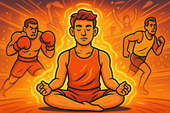
Keeping Calm in Competitive Sports: How to Train Your Mind, Body, and Chemistry for Peak Performance
Competitive pressure can overwhelm even the strongest athletes — but calm is trainable. By combining supplements like magnesium, L-theanine, and adaptogens with breathwork and mindset training, you can stay focused, balanced, and in control under any level of stress 🧠🏅.
-
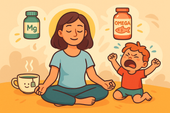
Supplements for Parents Facing Toddler Tantrums: Staying Calm When Little Emotions Run Wild
Toddler tantrums can drain even the most loving parent — but your calm is powerful. With the right supplements like magnesium, L-theanine, and ashwagandha supporting your nervous system, you can stay patient, grounded, and kind, even when emotions run high 🧸🌿.
-

Workplace Stress and Anger Management Support
Workplace stress can quickly turn into frustration — but calm is a skill you can train. By combining supplements like magnesium, L-theanine, and adaptogens with breathwork and mindset tools, you can stay focused, patient, and emotionally grounded no matter how intense the office gets 💼🌿.
-

How to Stay Patient With Family During Stressful Holidays
Holiday gatherings can stir up old stress and test your patience — but calm is possible. With nervous system support from magnesium, L-theanine, and adaptogens, plus mindful breathing and clear boundaries, you can stay centered, kind, and grounded even when family chaos unfolds 🎄💞.
-

Supplements to Keep Calm During Traffic Jams
Getting stuck in traffic doesn’t have to ruin your mood. With calming supplements like magnesium, L-theanine, and ashwagandha, you can train your body to stay relaxed and focused behind the wheel — turning gridlock into a moment of grounded patience 🚗🌿.
-
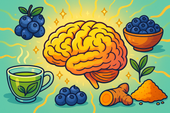
The Role of Antioxidants in Healing Brain Stress from Dissociation
Antioxidants protect the brain from the oxidative stress caused by trauma and dissociation. By neutralizing free radicals and supporting mitochondrial recovery, they help restore clarity, focus, and emotional balance — allowing the mind to heal at the cellular level 🌿🧠.
-
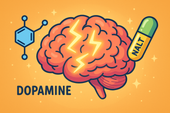
N-Acetyl L-Tyrosine (NALT) for Supporting Mental Clarity
N-Acetyl L-Tyrosine (NALT) fuels dopamine production — the neurotransmitter of focus and motivation. By supporting brain chemistry during stress, NALT helps restore mental clarity, energy, and alertness, making it easier to think clearly and feel present again ⚡🧠.
-

How Ginseng May Improve Focus and Energy in Dissociation
Ginseng helps combat the mental fatigue and fog that often come with dissociation. By supporting mitochondrial energy, balancing neurotransmitters, and regulating cortisol, it gently restores focus, motivation, and emotional presence — helping the mind reconnect with clarity and strength 🌿⚡.
-
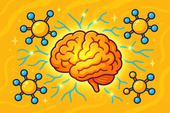
Phosphatidylserine and Dissociation: Supporting Cognitive Function
Phosphatidylserine helps calm the stress response by balancing cortisol, the body’s primary stress hormone. By lowering cortisol spikes, it protects memory, focus, and emotional stability — restoring clarity and mental presence for those struggling with dissociation 🧠🌿.
-
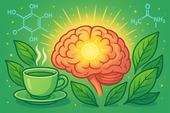
Can Green Tea Extract Help with Dissociative Brain Fog?
Green tea extract may help lift dissociative brain fog by supporting neurotransmitter balance, reducing inflammation, and enhancing energy at the cellular level. With its key compounds EGCG and L-theanine, it promotes calm focus, clarity, and emotional presence — helping you feel more alert and grounded 🍵🧠.
-
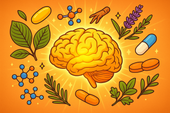
Building a Natural Supplement Stack for Dissociation Support
Building a supplement stack for dissociation means nourishing the brain and body back into communication. By supporting neurotransmitters, gut health, and energy balance through nutrients like magnesium, omega-3s, curcumin, and probiotics, you can help restore clarity, calm, and connection — one layer at a time 🌿🧠.
-

Chamomile and Lavender for Dissociative Anxiety Relief
Chamomile and lavender work together to calm dissociative anxiety by soothing the nervous system and restoring emotional safety. Their natural compounds balance cortisol, enhance GABA activity, and activate the vagus nerve — helping you feel grounded, connected, and at peace again 🌿💜.
-
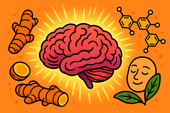
Curcumin for Inflammation and Mental Clarity in Dissociation
Curcumin, the golden compound in turmeric, does more than fight inflammation — it helps clear the mental fog often tied to dissociation. By calming neuroinflammation, balancing neurotransmitters, and supporting mitochondrial energy, curcumin can restore mental clarity, focus, and emotional presence 🌿🧠.
-
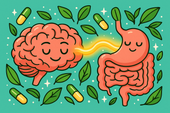
Probiotics and Dissociation: Exploring the Gut–Brain Axis
The gut–brain axis plays a vital role in emotional awareness and presence. When the microbiome is balanced, it supports serotonin production, vagus nerve activity, and calm focus. Probiotics help repair this connection — restoring safety, clarity, and the feeling of truly being in your body again 🌿🧠.
-
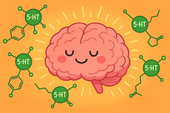
5-HTP for Dissociation: Supporting Serotonin and Emotional Stability
5-HTP helps bridge the gap between emotional numbness and stability by supporting serotonin production — the neurotransmitter that shapes mood, sleep, and sensory awareness. For people experiencing dissociation, 5-HTP may gently restore connection, presence, and emotional balance from the inside out 🌿🧠.
-
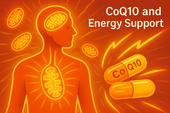
CoQ10 and Energy Support for People with Dissociation
Chronic dissociation often leaves the body running on empty — tired, foggy, and disconnected. CoQ10 helps recharge that system at the cellular level by restoring mitochondrial energy, reducing oxidative stress, and supporting the brain’s capacity to stay present. It’s energy medicine for both body and mind ⚡🧠.


















































